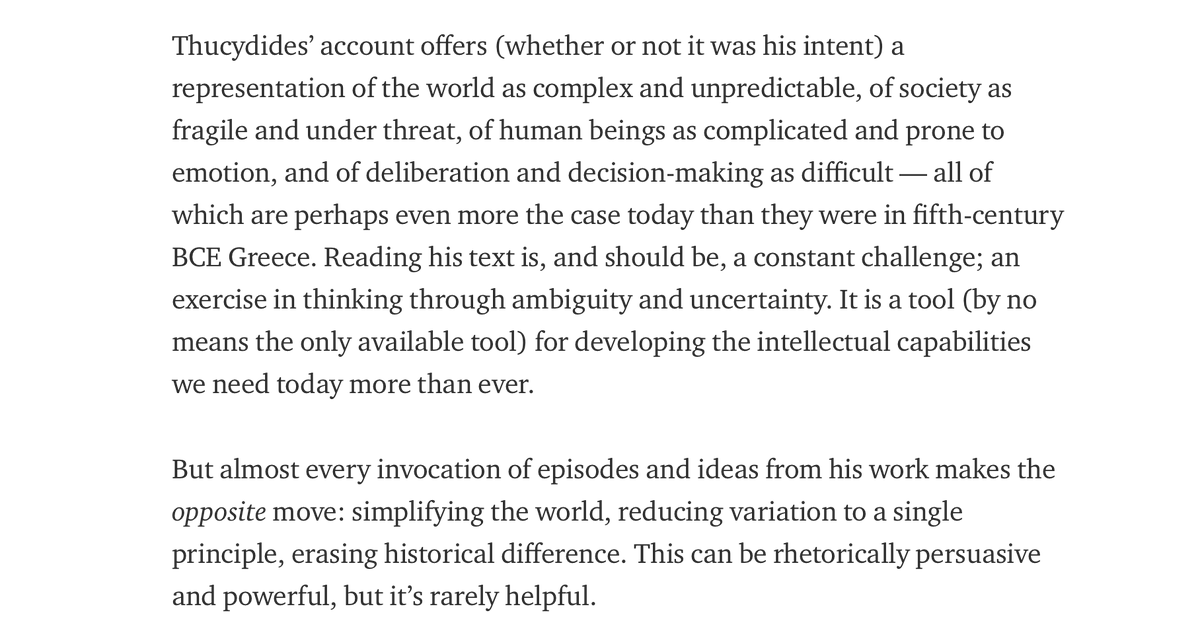A few words on this much-discussed (but IMHO problematic) piece in FP. First of all, I share some of the author's frustration. Trotting out the same passages of Thucydides when commenting on Sino-US rivalry has become something of a tired trope, not (1/25 https://foreignpolicy.com/2020/07/28/oh-god-not-the-peloponnesian-war-again/
...so dissimilar to those analysts & scholars (you know the ones) who begin every article or chapter with the same quotes from Clausewitz & aphorisms from Sun Tzu. It can be even more tiresome when it serves as a fig-leaf for a lack of regional expertise, or to project..(2/25)
..a thin veneer of cultural sophistication. However, I would argue that the problem is not that too many people draw on Thucydides, Clausewitz or Sun Tzu, but rather that they often do so superficially, self-servingly, & seem to not have actually read the texts in question.(3/25)
...On these superficial cherry-pickings and/or misreadings of Thucydides see @KoriSchake 's excellent 2017 essay in The Atlantic (4/25) https://www.theatlantic.com/international/archive/2017/07/the-summer-of-misreading-thucydides/533859/
..As Quentin Skinner & other members of the so-called Cambridge School have argued, before analyzing the work of a thinker, one should first acquire a fine-grained understanding of the intellectual "eco-system" and of the specific historical context within which... (5/25)
..said texts or ideas were produced. For an introduction to this approach--one I personally largely subscribe to, and which puts a strong focus on reading the author's intellectual influences and contemporaries--see Skinner's seminal article here: (6/25) https://www.jstor.org/stable/2504188?seq=1#metadata_info_tab_contents
I've also argued in @WarOnTheRocks that it is somewhat regrettable that folks in the security studies community don't devote more attention to other great classical historians, many of whom can provide equally rich insights on contemporary challenges..(7/25)
Polybius, for example, on the virtues of applied history, the management of unipolarity, and the challenges of alliance management: https://warontherocks.com/2019/03/polybius-applied-history-and-grand-strategy-in-an-interstitial-age/ (8/25)
Tacitus on Roman imperial grand strategy and on the enduring characteristics of authoritarianism (9/25) https://warontherocks.com/2020/07/thrones-wreathed-in-shadow-tacitus-and-the-psychology-of-authoritarianism/
The enormously influential but strangely under-examined Sallust would be another.I fully agree with the article's emphasis on the need for more work focused on Asian diplomatic and military history. For ex, Julia Lovell's magnificent overview of China's strategic behavior..(10/25
.. vis a vis the outside world remains one of my most precious sources of insights on China's history. Asian history remains woefully under-explored in the field of security studies (11/25) https://www.amazon.com/dp/B008V43MPM/ref=dp-kindle-redirect?_encoding=UTF8&btkr=1
For instance, Kautilya's Arthashastra is rife with fascinating perspectives on balancing, state formation & covert warfare, and we are in dire need of more detailed examinations of the text & its era (Although this provides a solid introduction:) https://www.amazon.com/First-Great-Political-Realist-Arthashastra/dp/0739106074/ref=sr_1_1?dchild=1&keywords=Roger+boesche&qid=1596103950&sr=8-1 (12/25)
I am heartened, however, by the fact that a new generation of security scholars have begun producing excellent work on these hitherto neglected strategic traditions. See, for example, @manjeetsp 's fascinating exploration of Mughal statecraft (13/25) https://www.tandfonline.com/doi/abs/10.1080/09636412.2017.1280300
Where I disagree with the FP article, however, is in its somewhat flippant assertion that the study of Thucydides should be sidelined because "conflicts between city-states in a backwater Eurasian promontory 2,400 years ago are an unreliable guide to modern geopolitics." (14/25)
Thucydides is one of the great pillars of the Western strategic and historiographical tradition & his work has inspired generation upon generation of political theorists & statesmen. Its enduring resonance is tied, precisely, to the perceived universality & timelessness (15/25)
of some of its observations on politics, war, and the human condition. That it has been occasionally plundered, misinterpreted, or crudely simplified should not be a reason for its sudden excision from IR curricula. Au contraire...(16/25)
...the solution to sloppy history or crude analogical reasoning is not to abandon the field of study in question, but to redouble one's efforts to acquire a more fine-tuned sense of what people such as Giucciardini described as historical "discernment" or "discretion," (17/25)
i.e. the ability to delve into, and learn from the shared reservoir of human experience, all while retaining a sense of intellectual humility and a recognition of the specificity of certain local and temporal conditions. (18/25)
With regard to the "constant challenge" of reading Thucydides, in particular, and the humility with which one should go about it, this essay by @NevilleMorley in @eidolon_journal is--in its degree of nuance and thoughtfulness--really worth reading: (19/25) https://eidolon.pub/why-thucydides-55b145152ec3
I also find the suggestion that one should dismiss certain periods in history, or certain strategic traditions as irrelevant to contemporary challenges in Asia not only wrong, but also somewhat disconcerting. (20/25)
Is the underlying premise that the lessons and insights to be derived from European history are somehow solely for Europeans, and the lessons and insights from Asian history solely for Asians? Can we not learn from our respective historical experiences? (21/25)
Similarly, can one really engage in the study of IR in the US or Europe without spending at least some time reading some of the great texts that not only shaped the development of art, religion, political theory, but also the very foundations of our systems of government? (22/25)
As one writer has noted, to read the Federalist papers is to enter into a running debate about Roman history, "in which the Roman example is one to be alternately emulated and shunned." https://www.newyorker.com/magazine/2012/01/09/the-empire-strikes-back-adam-kirsch (23/25)
Can one really stroll through Capitol Hill, or past the Assemblee Nationale in Paris, and somehow think that the history that so deeply suffused our forebears' collective imagination, fears and aspirations is no longer worthy of study? (24/25)
The danger is the emergence of a form of post-historical hubris & epochal exceptionalism--one which sadly leads to a lot of IR work simply reinventing the wheel & restating what our predecessors had already articulated, often with far greater sophistication & eloquence.(25/25)

 Read on Twitter
Read on Twitter


